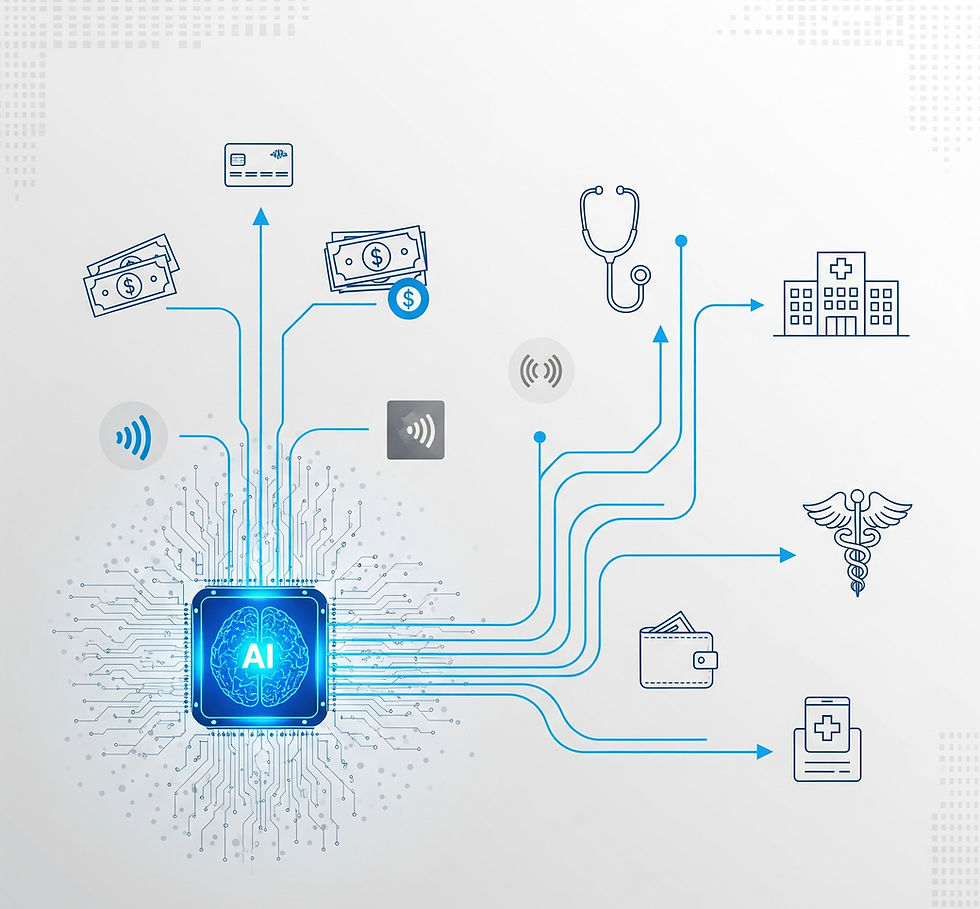The Role of Agentic AI in Transforming Healthcare Automation: A Deep Dive into Revenue Cycle Management (RCM) for Hospitals
- Zeurons AI team
- Nov 29, 2024
- 4 min read

Introduction
The evolution of Artificial Intelligence (AI) in healthcare is moving beyond simple task automation. With the rise of Agentic AI, hospitals can now orchestrate highly complex workflows that require reasoning, learning, and adaptation in real-time. Nowhere is this transformation more visible—and more urgently needed—than in Revenue Cycle Management (RCM), where inefficiencies can directly affect both hospital solvency and patient experience.
This article explores what Agentic AI is, how it differs from traditional automation, and how Zeurons AI is pioneering intelligent RCM solutions for hospitals globally.
What Is Agentic AI?
Agentic AI refers to artificial intelligence systems designed to act as autonomous “agents,” capable of understanding their environment, making decisions, adapting to new scenarios, and orchestrating actions across multiple domains. Unlike rule-based bots or basic RPA scripts, Agentic AI:
Understands context and intent behind complex workflows
Learns from past outcomes and adapts to changing hospital policies or payer rules
Collaborates with humans, EHR systems, and external payers in real-time
Proactively resolves exceptions instead of escalating every anomaly
In Revenue Cycle Management, this means moving from mere “automation” to true orchestration and optimization.
Why RCM Is Ripe for Agentic AI Transformation
Revenue Cycle Management is the backbone of hospital financial health. Yet, RCM remains plagued by:
Manual data entry and claim scrubbing
High denial rates due to ever-changing payer rules
Lag in authorizations and eligibility verification
Disjointed communication between departments and payers
Lack of real-time analytics for cash flow forecasting
Even with legacy RPA and DPA, most hospitals still struggle with exceptions and edge cases that break conventional automation.
The Agentic AI Approach: How It Works in RCM
Let’s break down how an Agentic AI-driven RCM system (like those built by Zeurons) operates at a technical level:
1. Multi-Source Data Ingestion and Semantic Understanding
Integrates with EHR, billing, clearinghouses, and payer portals
Uses Natural Language Processing (NLP) to interpret unstructured data (physician notes, scanned forms, email threads)
Understands the “why” behind data anomalies (e.g., mismatched codes, incomplete documentation)
2. Dynamic Rule Adaptation
Learns payer-specific rules for coding, documentation, and pre-authorization, updating itself as rules change
Applies contextual policy mapping—not just static rules—to decide claim submission or escalation
3. Real-Time Process Orchestration
Monitors claim status, denials, and payment postings in real time
Orchestrates next steps: resubmission, documentation requests, appeals, or patient communication
Communicates across departments and with payers using secure APIs and HL7/FHIR standards
4. Proactive Exception Handling
Detects patterns that indicate likely denials or delays before they happen
Automatically requests missing information from physicians or coding teams
Applies reinforcement learning to improve future exception management
5. Continuous Optimization and Human-in-the-Loop Collaboration
Escalates only truly ambiguous cases to human RCM staff, providing recommended actions and context
Learns from human resolutions, constantly refining its decision algorithms
Provides audit trails and explainable AI logs for compliance and reporting
Technical Stack: What Powers Agentic AI in RCM?
A robust Agentic AI solution for RCM typically involves:
NLP and NLU engines (for document and intent understanding)
Reinforcement learning frameworks (to adapt policies)
RPA connectors (for integration with legacy billing/EHR software)
API orchestration layers (for real-time interactions with external payers and clearinghouses)
Data lakes and analytics engines (for revenue prediction and trend analysis)
Security layers (for HIPAA compliance, auditability, and encryption)
At Zeurons, our platforms leverage open-source and enterprise AI stacks (e.g., TensorFlow, PyTorch, spaCy, custom RL agents) alongside secure integration middleware for the healthcare ecosystem.
Measurable Impact: Agentic AI in Action
Case Example:A large multi-specialty hospital using Zeurons’ Agentic AI RCM platform achieved:
35% reduction in claim denials in the first quarter
50% faster turnaround for prior authorizations and eligibility checks
Real-time analytics for the CFO, allowing better cash flow planning
Fewer manual interventions: freeing staff to focus on patient-facing tasks
Challenges and How to Overcome Them
Implementing Agentic AI in hospital RCM is not plug-and-play. Success requires:
Clean, well-integrated data across departments
Executive buy-in and change management (AI agents are co-workers, not just tools)
Ongoing training and human oversight
Strong compliance and security controls
Zeurons partners with hospital IT and compliance teams to ensure all these elements are covered, from initial workflow mapping to post-launch monitoring.
The Future: Adaptive, Predictive, and Human-Centric
With Agentic AI, the future of RCM is:
Predictive: spotting cash flow risks before they affect operations
Adaptive: seamlessly updating as regulations and payer requirements change
Human-centric: empowering RCM teams to focus on complex, value-add tasks
Hospitals using Agentic AI will not only accelerate reimbursement and reduce denials but will also gain a competitive edge in the era of value-based care.
Conclusion
Agentic AI is redefining what’s possible in Revenue Cycle Management for hospitals.By moving beyond traditional automation to intelligent, adaptive, and proactive workflow orchestration, Zeurons is enabling hospitals to unlock new levels of efficiency, compliance, and financial performance.
Ready to explore Agentic AI for your hospital’s RCM?
Contact Zeurons AI to schedule a strategy session with our experts.
Zeurons AI delivers intelligent, secure, and scalable automation solutions tailored for modern healthcare. Discover more at www.zeurons.com.




Comments